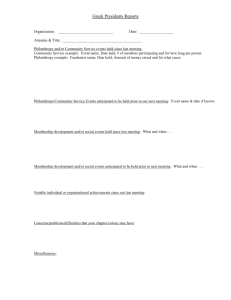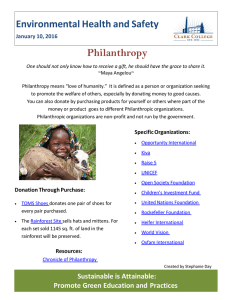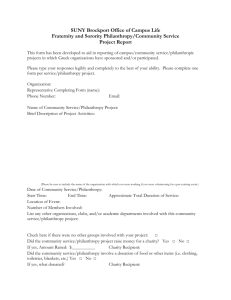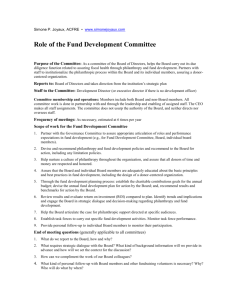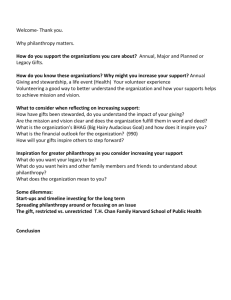A Businesslike Approach to Charity
advertisement
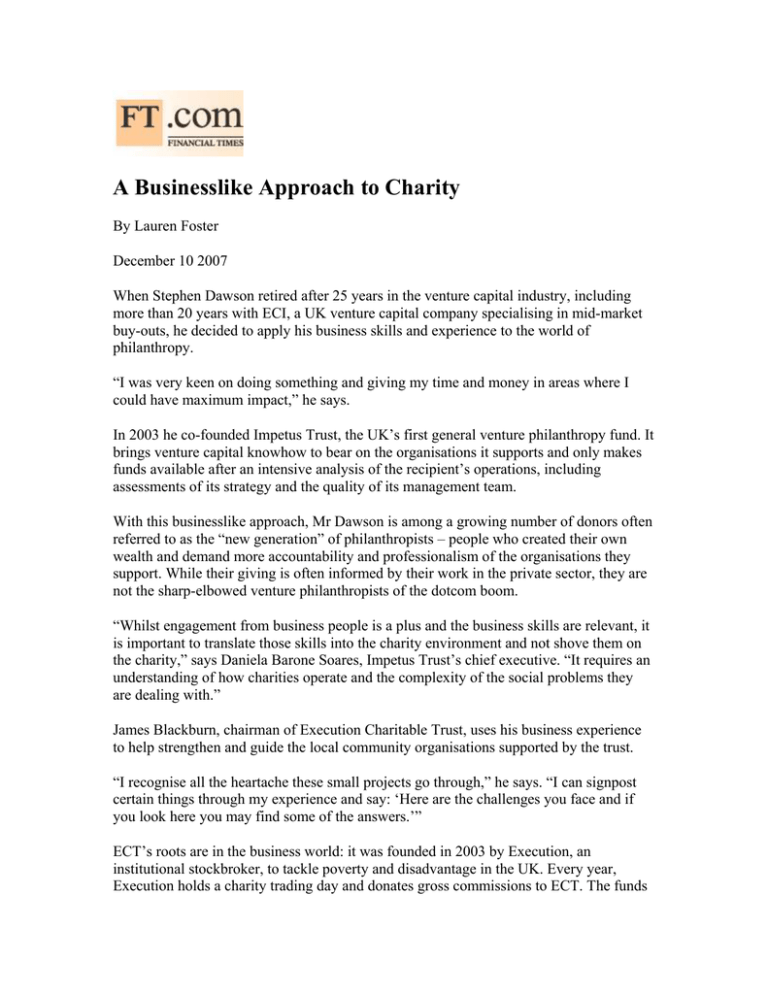
A Businesslike Approach to Charity By Lauren Foster December 10 2007 When Stephen Dawson retired after 25 years in the venture capital industry, including more than 20 years with ECI, a UK venture capital company specialising in mid-market buy-outs, he decided to apply his business skills and experience to the world of philanthropy. “I was very keen on doing something and giving my time and money in areas where I could have maximum impact,” he says. In 2003 he co-founded Impetus Trust, the UK’s first general venture philanthropy fund. It brings venture capital knowhow to bear on the organisations it supports and only makes funds available after an intensive analysis of the recipient’s operations, including assessments of its strategy and the quality of its management team. With this businesslike approach, Mr Dawson is among a growing number of donors often referred to as the “new generation” of philanthropists – people who created their own wealth and demand more accountability and professionalism of the organisations they support. While their giving is often informed by their work in the private sector, they are not the sharp-elbowed venture philanthropists of the dotcom boom. “Whilst engagement from business people is a plus and the business skills are relevant, it is important to translate those skills into the charity environment and not shove them on the charity,” says Daniela Barone Soares, Impetus Trust’s chief executive. “It requires an understanding of how charities operate and the complexity of the social problems they are dealing with.” James Blackburn, chairman of Execution Charitable Trust, uses his business experience to help strengthen and guide the local community organisations supported by the trust. “I recognise all the heartache these small projects go through,” he says. “I can signpost certain things through my experience and say: ‘Here are the challenges you face and if you look here you may find some of the answers.’” ECT’s roots are in the business world: it was founded in 2003 by Execution, an institutional stockbroker, to tackle poverty and disadvantage in the UK. Every year, Execution holds a charity trading day and donates gross commissions to ECT. The funds are then donated to local community organisations throughout the UK on the advice of New Philanthropy Capital, a charity that advises donors on how to give more effectively. ECT’s mission is to be “an entrepreneurial and progressive funder” of effective charities. “Our approach is really that we want to build relationships for the long term; we want to know what they do well and badly and how we can help them achieve their goals,” says Mr Blackburn, who helped found the stockbroker in 2001. “We recognised that by encouraging them to be open and honest, and by sharing good and bad, we would try and find solutions from our own experiences in building a company. While it is not all the same, there are similarities.” The application of business principles to philanthropy is what many say defines this new generation of philanthropists. But others point out that this approach dates back to the days of Andrew Carnegie and John D. Rockefeller, the forefathers of American philanthropy. New philanthropy, they say, is simply an old approach in new hands. In the preface of his book The Foundation: A Great American Secret, Joel Fleishman writes that Mr Carnegie, founder of the first major US foundation, “urged the rich to give away their wealth during their lifetimes so that they could apply to their philanthropy the same entrepreneurial skills and zeal for efficiency that they employed in its accumulation”. In an interview with the Financial Times earlier this year, Susan Berresford, president and chief executive of the Ford Foundation, said the dichotomy between “old” and “new” was a “dangerous” one. “The way new philanthropy is characterised in the media often is to say it is more ambitious, more results oriented, and uses business principles more and to great effect, and I don’t think there is anything more ambitious about new philanthropy than old philanthropy,” she said. “Hundreds of foundations for decades worked to address apartheid, hundreds of foundations worked to support the civil rights movement in this country, there is nothing more ambitious than those noble aims.” Still, new philanthropy is increasingly part of the dialogue and those who favour its use say several characteristics define this generation of givers. Adam Waldman, founder and president of the Endeavor Group, a Washington-based philanthropic consultancy, says the hallmarks of the so-called new philanthropy are: an entrepreneurial, results-oriented framework; leverage; personal engagement; and impatience. “New philanthropists may be mavericks in their business lives but rarely are solo in their philanthropic lives – they have an intense desire to partner with each other,” he says. “New philanthropy is also marked by the principal’s personal engagement in the work. It isn’t about hiring people and saying, ‘Let me know how it works out’, it is about getting on planes, going to meetings and reading documents. For many new philanthropists, this becomes their job.” One such donor, and a client of the Endeavor Group, is technology entrepreneur Ed Scott, a former senior US government official and co-founder of BEA Systems, the software company. His philanthropy is informed not by the private sector’s thirst for instant gratification but by the laser-like focus honed building a business. “When I was in the business world I had tunnel vision,” he says. “I only cared about the company being successful and nothing else. A nuclear weapon could have landed in Kansas City and I wouldn’t have noticed it. Once I left the business I had to re-educate myself about the state of the world. I became interested in debt as systemic issue and I began to read more about it.” Over the course of many discussions, Mr Scott learnt that policymakers had nowhere to turn for reliable information and what was needed was a centre staffed by people who really knew what they were talking about. In 2001, he co-founded the Center for Global Development, an independent, non-profit think-tank that works to reduce global poverty and inequality. He chairs its board. Mr Scott also helped found, with George Soros and Bill Gates, Debt Aids Trade Africa, and Friends of the Global Fight, which works to educate, engage, and mobilise Americans in the fight against Aids, tuberculosis and malaria. He is also an active board member in Malaria No More, which is co-chaired by Peter Chernin and Ray Chambers. This level of donor engagement typifies what Melanie Schnoll-Begun, a managing director and head of Citi Family Office Philanthropic Services, calls “personal missions”. Increasingly, philanthropists “are looking for causes they can get their arms around and really measure a difference”, she says. Something else she sees a lot is the drive for measurable outcomes. “Many of the donors who are stressing the need for immediate results and high-impact strategy don’t want to look like they invested in something that failed – they don’t want family and friends to think their success was a fluke,” she says. This quest for results – often in a short time frame – is something beneficiary organisations need to keep in mind when seeking funds. “The generation we are dealing with today has an unending thirst and desire for sudden impact, they want results,” she says. “They have acquired their wealth not by working at family business for 20 or 30 years and then opting to sell; they acquired their wealth overnight and so they want to see their philanthropic dollars making a difference overnight. Is it fair? No. Is it Right? No. Organisations need to take a step back and educate donors about how difficult it is to measure results.”

